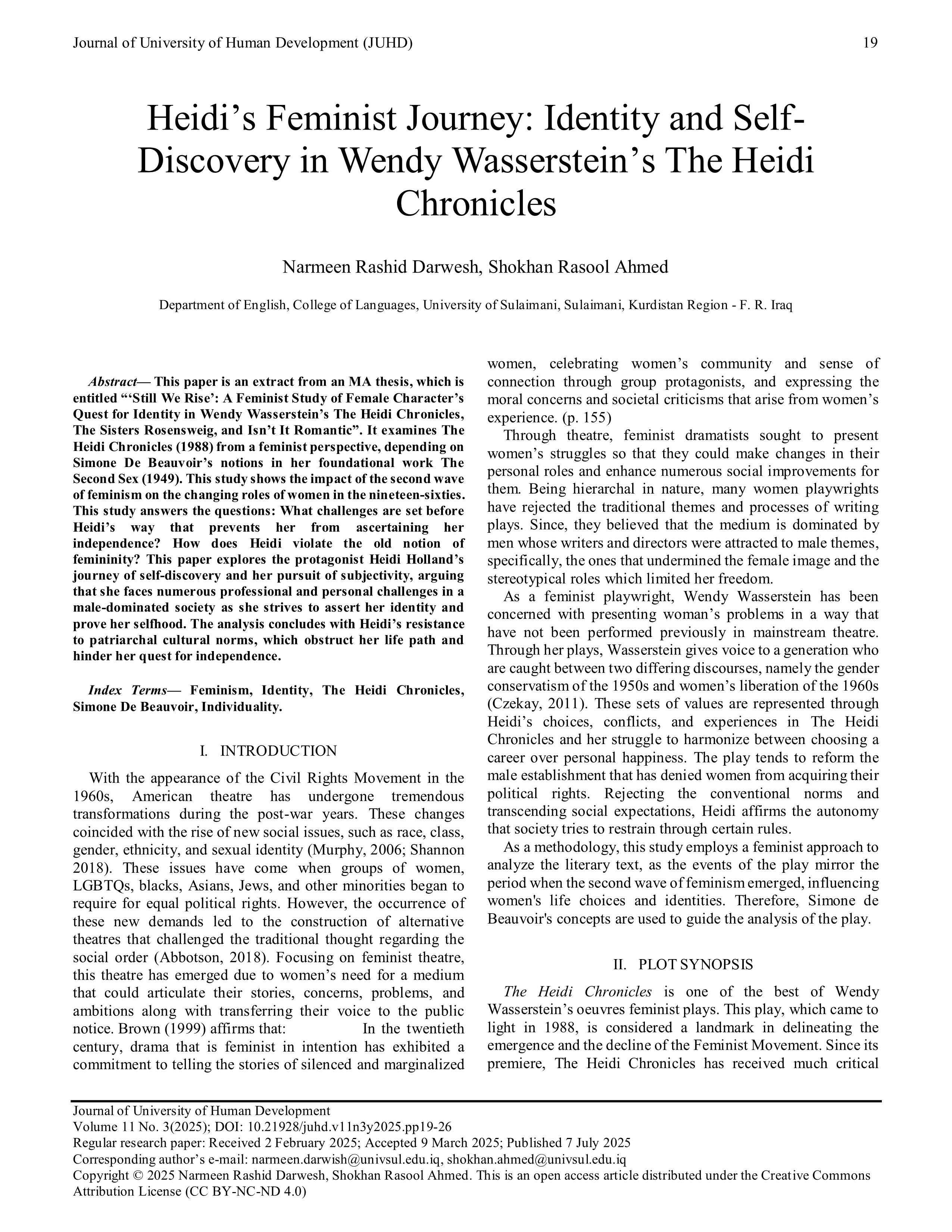Heidi’s Feminist Journey: Identity and Self-Discovery in Wendy Wasserstein’s The Heidi Chronicles
DOI:
https://doi.org/10.21928/juhd.v11n3y2025.pp19-26Keywords:
Feminism, Identity, The Heidi Chronicles, Simone De Beauvoir, IndividualityAbstract
This paper is an extract from an MA thesis, which is entitled “‘Still We Rise’: A Feminist Study of Female Character’s Quest for Identity in Wendy Wasserstein’s The Heidi Chronicles, The Sisters Rosensweig, and Isn’t It Romantic”. It examines The Heidi Chronicles (1988) from a feminist perspective, depending on Simone De Beauvoir’s notions in her foundational work The Second Sex (1949). This study shows the impact of the second wave of feminism on the changing roles of women in the nineteen-sixties. This study answers the questions: What challenges are set before Heidi’s way that prevents her from ascertaining her independence? How does Heidi violate the old notion of femininity? This paper explores the protagonist Heidi Holland’s journey of self-discovery and her pursuit of subjectivity, arguing that she faces numerous professional and personal challenges in a male-dominated society as she strives to assert her identity and prove her selfhood. The analysis concludes with Heidi’s resistance to patriarchal cultural norms, which obstruct her life path and hinder her quest for independence.
References
Abboston, S. C. W. (2003). Thematic Guide to Modern Drama. Greenwood Press.
---- (2018). Introduction to the 1950s. In Brenda Murphy and Julia Listengarten (Eds.), Modern American Drama: Playwriting in the 1950s Voices, Documents, New Interpretations (pp. 1-97). Bloomsbury Methuen Drama.
Al-Munshi, Z. D. (2020). “Diversity of Women’s Experiences: A Feminist Study of Wendy Wasserstein’s The Heidi Chronicles and Marsha Norman’s Getting Out.” Al-Bahith Journal, 36 (1) , 506-543. https://www.iasj.net.
Balakian, J. (2010). Reading the Plays of Wendy Wasserstein. Applause Theatre and Cinema.
Barko, C. C. (2008). “Rediscovering Female Voice and Authority: The Revival of Female Artists in Wendy Wasserstein’s The Heidi Chronicles.” A Journal of Women Studies, 29 (1), 121-138. https://www.jstor.org.
Başer, D. B. (2016). “From Superiority to Equality?: Men’s Voices in Wendy Wasserstein’s Plays” [Master’s Thesis, Hacettepe University]. https://openaccess.hacettepe.edu.tr
Bigsby, C. (2004). Contemporary American Playwrights. Cambridge University Press.
Bressler, C. E. (2011). Literary Criticism: An
Introduction to Theory and Practice. (5th ed.) . Pearson Education.
Czekay, A. (2011). ‘Not Having It All’: Wendy Wasserstein’s Uncommon Women. In J. Herrington (Ed.), The Playwright’s Muse (pp. 17-51). Routledge.
De Beauvoir, S. (1956). The Second Sex. Jonathan Cape.
Dobie, A. B. (2012). Theory into Practie: An Introduction to Literary Criticism (3rd ed.). Wadsworth Cengage Learning.
Dolan, J. (2017). Wendy Wasserstein. University
of Michigan Press.
Elhalafawy, A. I. (2015). Pirandellian Dark Comedy in Wendy Wasserstein’s (The Heidi Chronicles). Annals of the Faculty of Arts, Ain Shams University, 43, 511 - 544. https://aafu.journals.ekb.eg.
Hodgson-Wright, S. (2006). Early Feminism. In
S. Gamble (Ed.), The Routledge Companion to
Feminism and Postfeminism (pp. 3-14). Routledge.
Keyssar, H. (1991). Drama and the Dialogic Imagination: The Heidi Chronicles and Fefu and Her Friends. University of Toronto Press, 34 (1), 653 - 662. https://utppublishing.com.
Knellwolf, C. (2001). The History of Feminist Criticism. In C. Knellwolf & C. Norris (Eds.), The Cambridge History of Literary Criticism: Twentieth-Century Historical, Philosophical and psychological Perspectives (pp. 193-205). Cambridge University Press.
Li, J. (2016). Self in Community: Twentieth-Century American Drama by Women [PhD. Dissertation, Hong Kong Babtist University]. https://scholars.hkbu.edu.hk
Lively, F. (2014). Wendy Wasserstein. In M. Middeke et al. (Eds.), The Methuen Drama Guide to Contemporary American Playwrights (pp. 411 - 430). Bloomsbury Methuen Drama.
Murphy, B. (2006). Theatre. In Christopher Bigsby (Ed.), The Cambridge Companion to Modern American Culture (pp. 411-428). Cambridge University Press.
Plain, G., & Sellers, S. (2007). Introduction. In G. Plain & S. Sellers (Eds.), A History of Feminist Literary Criticism (pp. 1-3). Cambridge University Press.
Potts, K. (2015). The Pulitzer Prize and Women: An Investigation intoThree Decades of Winning Plays by Female Dramatists (1981-2009) [PhD. Dissertation, The City University of New York]. https://academicworks.cuny.edu.
Rice, P., & Waugh, P. (2001). Modern Literary theory: A Reader (4th ed.). Arnold.
Roudané, M. (2000). Plays and Playwrights since 1970: Wendy Wasserstein. In Don B. Wilmeth & Christopher Bigsby (Eds.), The Cambridge History of American Theatre: Volume 3, Post-World War II to the 1990s (pp. 331- 418). Cambridge University Press.
Selden, R., Widdson, P., & Brooker, P. (2005). A
Reader’s Guide to Contemporary Literary Theory (5th ed.) . Pearson Education.
Shannon, S. G. (2018). American Theatre in the 1980s. In Brenda Murphy and Julia Listengarten (Eds.), Modern American Drama: Playwriting in the 1980s Voices, Documents, New Interpretations (pp. 29-42). Bloomsbury Methuen Drama.
Shih, Y. (2018). Uncommon Women’s Dilemmas in Wendy Wasserstein’s Quasi-Trilogy. International Journal of Applied Linguistics & English Literature¬, (7) 4, 213- 221. http:// www.ijalel.aiac.org.au.
Suwardi, A. (2010). Feminism as Literary Criticism: Its Development, Figures, and Themes. Prosodi: Jurnal Ilmu Bahasa dan Sastra, 4 (2), 1-11. https://www.semanticscholar.org.
Tyson, L. (2015). Critical Theory Today: A User- Friendly Guide (3rd ed.). Routledge.
Wasserstein, W. (1990). The Heidi Chronicles. Vintage Books.
Woo, M. (2011). Postfeminism Debates in Theater: Theory versus Practice and Women’s Dilemmas in Wendy Wasserstein’s The Heidi Chronicles. Feminist Studies in English Literature, 19 (3), 69-98. https://oak.go.kr.

Downloads
Published
How to Cite
Issue
Section
License
Copyright (c) 2025 Narmeen Rashid Darwesh, Shokhan Rasool Ahmed

This work is licensed under a Creative Commons Attribution-NonCommercial-NoDerivatives 4.0 International License.


